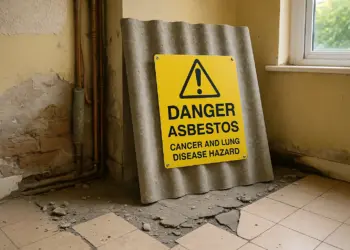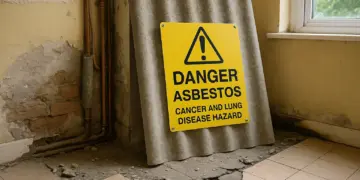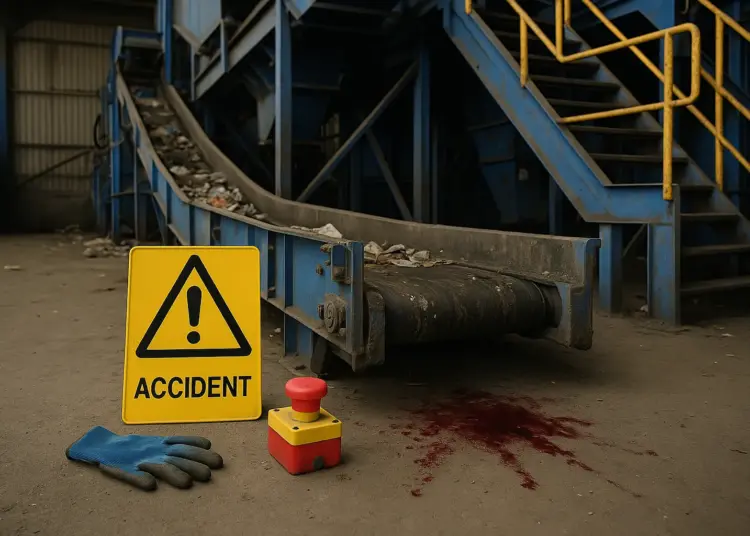Story Highlight
– Company fined £270,000 after employee injury incident.
– Worker injured during cleaning of waste picking line.
– Machinery accidentally restarted by supervisor during mix-up.
– Employee suffered multiple serious injuries in the incident.
– HSE emphasizes need for proper isolation procedures.
Full Story
A waste and recycling company based in North East England has been handed a hefty fine of £270,000 following a serious workplace accident involving one of its employees. The incident occurred on 24 March 2023, when an employee was carrying out cleaning duties on a waste picking line and became trapped in machinery that was inadvertently switched on.
The Health and Safety Executive (HSE) conducted an investigation into the circumstances surrounding the incident, revealing significant oversight regarding machinery isolation protocols at the site, situated in Aycliffe Quarry, Aycliffe Village, County Durham.
During the cleaning process, a senior supervisor mistakenly restarted the machinery, believing the employee involved was a colleague who was wearing similar attire. As a result of the incident, the worker sustained multiple injuries, including a fractured shoulder, torn ligaments, and a broken finger, highlighting the severe consequences of not adhering to safety guidelines.
This incident marks not the first time safety failures have had dire repercussions at the facility. In December 2015, a tragic event unfolded where one worker lost their life and another sustained life-altering injuries, again due to lapses in following proper isolation and lock-off procedures while working on a similar waste sorting line.
The HSE’s investigation underscores the critical need for employers to enforce stringent isolation measures and ensure that all machinery is disconnected from power sources before any maintenance or cleaning activities take place. The agency maintains that these procedures should be regularly reviewed to avoid accidental start-ups that could lead to severe injuries.
In a hearing held at Teesside Crown Court, Stonegrave Aggregates Limited, part of the Ashcourt Group located at Halifax Way, Pocklington, entered a guilty plea for violating Section 2(1) of the Health and Safety at Work etc. Act 1974. In addition to the substantial fine, the company was also ordered to cover costs amounting to £15,637.
After the court proceedings, HSE inspector Darian Dundas commented on the necessity of effective monitoring and auditing of isolation procedures: “Effective monitoring, auditing and review of isolation systems is essential to demonstrate that they are working and controlling risk. Incidents like this can and should be prevented by following robust lock-off procedures.”
This case was part of the enforcement efforts led by HSE Enforcement Lawyer Karen Park, with support from Paralegal Officer Rebecca Foreman.
The HSE acts as the primary body governing health and safety in workplaces across the UK, aiming to protect individuals and ensure safer environments. The regulator’s guidance makes clear the importance of safe isolation of equipment, outlining that employers have a duty to enforce these practices rigorously to prevent future accidents.
The ramifications of this incident extend beyond fines; they serve as a sobering reminder of the critical importance of workplace safety protocols in the waste management industry. As the sector continues to grow, the enforcement of health and safety regulations will remain imperative to safeguarding the well-being of all employees.
Further details about health and safety legislation and HSE’s latest news can be accessed through their official communication channels. HSE does not impose sentences or collect fines; these actions are determined by the judiciary, adhering to relevant sentencing guidelines unless a court decides it is in the interest of justice to deviate from them. The guidelines for offences related to health and safety can also be found through HSE’s resources.























This case is a stark reminder that complacency with isolation procedures can have devastating consequences. Proper lockout tagout controls clear identification of personnel and secure communication are basic but essential. Supervisors must never assume and workplaces must ensure systems are in place so machinery cannot be restarted while anyone is exposed. Training alone is not enough; procedures must be enforced, audited and supported by a safety culture that empowers workers to stop work if controls are unclear.
This incident is a stark reminder that clear isolation procedures and positive identification checks are not optional. Lockout tagout and fail safe interlocks must be enforced and supervisors must never assume who is at a machine. Regular training, visible signage and routine auditing of permit to work systems would help prevent this type of avoidable harm.
Terrible outcome that was entirely avoidable. This incident shows how vital it is to have robust lockout tagout procedures, clear communication and positive identification of personnel before restarting equipment. Supervisors must be trained and competent to follow isolation checks every time and workers must feel empowered to stop work if safety steps have not been completed. Companies should review procedures, provide refresher training and ensure audits catch weak practice before someone is harmed. The fine is a reminder that complacency with basic safety controls can have severe human and legal consequences.